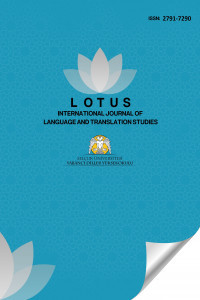Dorian Gray’in Portresini, Immanuel Kant’ın Ahlak Felsefesiyle Yeniden Düşünmek
Victoria döneminin en ünlü romanlarından birisi olan Dorian Gray’in Portresi, yayımından bu yana hem edebiyat hem de felsefe çalışmalarının odak noktası olmuştur. Oscar Wilde, romanın benzersiz karakterleri aracılıyla yalnızca Victoria toplumunu eleştirmez, ayrıca ahlakı sorgular. Bu çalışma, Wilde’ın Dorian Gray’in Portresi eserini, Immanuel Kant’ın ahlak felsefesi aracılıyla tetkik edecektir. Kant, ahlak felsefesinin büyük bir kısmını “hüsnüniyet” kavramı üzerine kurmuştur, ki bu ayrıca onun “ödev” fikrinin temelidir. Bu fikre göre, “hüsnüniyet” ile yerine getirilen eylemler, ayrıca evrenselleştirilebilecek ilkeler ile yerine getirilmelidir. Bu eylemler insanlığı ve insanların hayatlarını da kolaylaştırmalıdır. Bu fikrin aksine, arzularını ve tutkularını takip eden Dorian’ın karakterindeki aşamalı değişimler, onun “hüsnüniyet” inin ve ahlak duygusunun kötüleşmesine ve yitimine sebep olur. Bu çalışma, Dorian’ın çalkantılı karakterinin, Kant’ın ahlak felsefesiyle olan uyuşmazlıklarını tetkik etmeyi amaçlamaktadır.
Anahtar Kelimeler:
Dorian Gray’in Portresi, Etik, Immanuel Kant, Hüsnüniyet, Ödev
Re-Envisioning the Picture of Dorian Gray Through Immanuel Kant’s Moral Philosophy
One of the most prominent novels of the Victorian era, The Picture of Dorian Gray has been a focus of both literary and philosophical studies since its publication. Oscar Wilde not only criticizes Victorian society through unique characters of the novel but also investigates ethics. This study will explore Wilde’s The Picture of Dorian Gray under the light of Immanuel Kant’s moral philosophy. Wild grounds much of his understanding of morals upon the concept of “good will”, which is also the foundation of Kant’s “duty”. According to his idea, the actions that are done in accordance with “good will” are supposed to be done with the maxims that can be universalized. These actions must develop humanity and lives of people, as well. Contrary to this view, gradual changes of Dorian’s character, as he follows his desires and passions, leads to deterioration and loss of his “good will” and moral sentiment. This study sights to explore the incongruences of Dorian’s fluctuant character with Immanuel Kant’s moral philosophy.
Keywords:
The Picture of Dorian Gray, Ethics, Immanuel Kant, Good will, Duty,
___
- Alexander, L. a. (2020, September 21). Stanford Encyclopedia of Philosophy. Deontological Ethics:
- Cummiskey, D. (1990). Kantian Consequentialism. Ethics, 586-615.
- Humphries, J. (2010). Childhood and Child Labour in the British. New York: Cambridge University Press.
- Kant, I. (1991). Metaphysics of Morals. New York: Cambridge University Press.
- Kant, I. (2002). Groundwork for the Metaphysics of Morals. New Haven and London: Yale University Press.
- Li, H. (2017). Vision and Self-Consciousness in. Canadian Review of Comparative Literature /, 565-578.
- Loftus, D. (2017, 02 17). https://www.bbc.co.uk. https://www.bbc.co.uk/history/british/victorians/middle_classes: https://www.bbc.co.uk/history/british/victorians/middle_classes_01.shtml
- Manganiello, D. (1983). Ethics and Aesthetics in "The Picture of Dorian Gray". The Canadian Journal of Irish Studies, 25-33.
- Weedman, D. (2014). Men, Monsters and Morality: Shaping Ethics through the Sublime and Uncanny. Humanities Capstone.
- Wilde, O. (2017). The Picture of Dorian Gray. London: Macmillan Collector's Library.
- Wilson, C. (1965). Economy and Society in Late Victorian Britain. The Economic History Review, 183-198.
- Başlangıç: 2021
- Yayıncı: Selçuk Üniversitesi
Sayıdaki Diğer Makaleler
ÇİN KLASİK METİNLERİNDE YAKIN ANLAMLILIK SORUNU: “KIRGIZ” ADI ÖRNEĞİ
Dorian Gray’in Portresini, Immanuel Kant’ın Ahlak Felsefesiyle Yeniden Düşünmek
Çin Düşüncesi ve Kültürü Temel Kavramları I
The Translation Process: The Status of Tranface (the Translator’s Preface) Among Iranian Readers
Kültürlerarası Teknik İletişimin Görsel Yönleri: Bilişsel Bilimsel ve Göstergesel Bakış Açısı
